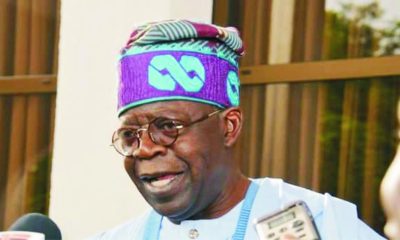Business
Terrorism: New Rules Restrict Passengers’ Movement
Some airlines were telling passengers on Saturday that new government security regulations prohibit them from leaving their seats beginning an hour before landing
The regulations are a response to a suspected terrorism incident on Christmas Day.
Air Canada said in a statement that new rules imposed by the Transportation Security Administration limit on-board activities by passengers and crew in U.S. airspace. The airline said that during the final hour of flight passengers must remain seated. They won’t be allowed access to carryon baggage or to have any items on their laps.
Flight attendants on some domestic flights are informing passengers of similar rules. Passengers on a flight from New York to Tampa Saturday morning were also told they must remain in their seats and couldn’t have items in their laps, including laptops and pillows.
The TSA issued a security directive for U.S.-bound flights from overseas, according to a transportation security official who spoke on condition of anonymity because the official was not authorised to speak publicly.
The official said passengers travelling internationally could see increased security screening at gates and when they check their bags, as well as additional measures on flights such as stowing carryons and personal items before the plane lands.
Homeland Security Secretary Janet Napolitano said in a statement Saturday that passengers flying to the U.S. from overseas may notice extra security, but she said the measures “are designed to be unpredictable, so passengers should not expect to see the same thing everywhere.”
A Nigerian passenger on a Northwest Airlines flight from Amsterdam allegedly attempted to start a fire as the plane prepared to land in Detroit on Friday, according to authorities. The incident has sparked a major international terrorism investigation.
Air Canada said it was limiting passengers to one carryon bag in response to a request from the U.S. and Canadian governments.
The airline advised U.S.-bound passengers to restrict their carryon item to “the absolute minimum” or not to carry any bag on board at all.
“Carriage of any carryon item will result in lengthy security delays for the customer,” the airline said.
U.S.-bound flights on all airlines are experiencing significant delays, said Duncan Dee, Air Canada’s executive vice president and chief operating officer.
A spokeswoman with Infraero, a Brazilian government agency that oversees airport infrastructure, said that airlines had been asked by federal authorities to add another layer of security for international flights originating in the country after the attempted attack in the U.S.
The official, who spoke on condition of anonymity because she was not authorised to discuss the matter, said that passengers would face an extra screening that would take place just before they boarded planes. She would give no more details, citing security concerns.
David Castelveter, a spokesman for the Air Transport Association, said the domestic airline industry has been in close coordination with the security administration since Friday’s incident and there will be increased scrutiny of passengers. He declined to comment on whether new regulations have been put in place.
Business
Over $1.5bn Spent To Protect Nigeria’s Oil Installations -FG

The Federal Government has said it has spent over $1.5 billion from 2020 to date to protect the nation’s oil installations and curb crude oil theft.
The Secretary to the Government of the Federation (SGF), George Akume, made this known, yesterday, at a public hearing of the House of Representatives on crude oil theft.
Akume was represented by the Permanent Secretary, General Services, Maurice Nandi.
The Federal Government was concerned about the report from the Nigerian Extractive Industries Transparency Initiative (NEITI), which pointed to over $46 billion worth of stolen crude between 2009 and 2020.
“The House had set up a special committee, headed by the Chairman of the House Committee on Petroleum Upstream, Ado Doguwa, to investigate the losses in the oil and gas sector,” Akume said.
Additionally, Speaker of the House Tajudeen Abbas, represented by Deputy Speaker Benjamin Kalu, said $10 billion has been lost in seven months to crude oil theft.
Business
FG Unveils Metering Project Teams To Combat Oil Theft

The Nigerian Upstream Petroleum Regulatory Commission (NUPRC) has inaugurated Metering Audit and Advance Cargo Declaration project teams, to promote transparency and accountability in the upstream oil and gas.
The Commission’s Chief Executive, Mr Gbenga Komolafe, who spoke at the inauguration of the project teams, on Wednesday in Abuja, said the projects were designed to combat crude oil theft and boost revenue.
It will be recalled that the Federal Executive Council (FEC) had approved a 21 million dollars contract to audit metering and measurement equipment in the 187 oil flow stations in the country and also put in place an advance cargo declaration solution.
These initiatives as earlier announced by Minister of State for Petroleum Resources Sen. Heineken Lokpobiri, aims at enhancing monitoring and accountability in crude oil production and distribution, addressing rampant oil theft.
Komolafe, while inaugurating the project monitoring teams, announced a four-month deadline for the completion of the projects.
According to him, the initiatives zre in line with NUPRC’s mandate to ensure optimal government revenues from upstream petroleum operations, as specified in the Petroleum Industry Act (PIA) 2021.
He said the projects would be executed by PE Energy Limited and P-Lyne Energy.
“Audit of Upstream Measurement Equipment and Facilities project aims to establish reliable baseline data for all measurement points, identify gaps in production and allocation measurement, and implement targeted interventions to enhance metering infrastructure.
“This project is crucial in addressing issues such as the presence of obsolete equipment, lack of a comprehensive database and absence of real-time production measurement across many locations.
“Advance Cargo Declaration Solution complements the metering audit by establishing a robust system for declaring and tracking crude oil transportation and exports from Nigeria,” he said.
He said the project would monitor and account for the movement of crude oil within the country, prevent disruptions, theft, and under-declaration, and ensure that only certified products were being exported.
“It will also enable real-time tracking, reconciliation, and reporting of crude oil exports to facilitate accurate revenue billing and generation.
“For a long time as a nation we have suffered from the menace of crude oil theft and there have been contentions on the accuracy in terms of our hydrocarbon accounting in Nigeria in a manner that has impacted our federal revenue unfavourably.
“So what has happened is that the commission, within its assumption of office, has been able, as a regulator, to take a very bold measure to address this issue.
“We have 31 crude oil loading terminals. So we are trying to ensure that we put in place a framework where the nation will be able to accurately determine and measure the volume of crude that is loaded from these terminals,” he said.
He tasked the teams, comprising experts from various NUPRC’s departments, to discharge their duties professionally, adding that the projects would be delivered within four months, while any request for timeline extension would not be entertained.
The NURPC boss said that each project had a dedicated team, led by Mr Enorense Amadasu, Executive Commissioner for Development and Production, NURPC, with strict timelines for completion.
While commending President Bola Tinubu for his support, Komolafe urged stakeholders to cooperate with the teams to facilitate successful implementation of the projects.
“Team for Audit of Upstream Measurement Equipment and Facilities in the Nigerian Oil and Gas Industry” project comprise ; Manuel Ibituroko – Deputy Director, Facilities Engineering & Optimisation; Mohammed Sirajo – Manager, Facilities Engineering; Ike Chidi – Manager, Facilities Engineering; and Bashir Shariff – Principal Regulatory Officer.
“Team for Advance Cargo Declaration Solution” project, comprise: Bello Shehu – Assistant Director, Crude Oil & Gas terminal Operations; Abdulrahman Idris – Manager, Petroleum Accounting; Omeje Desmond – Deputy Manager, COTO PHC; Dimkpa I. H. – PRO, COTO Warri and Olatunji Babatunde – NDR”.
He said the teams would liaise with the contractors to ensure the fulfilment of the Commission’s specified obligations and monitoring the implementation of the projects to ensure alignment with the scope and specifications.
Responding, one of the two contractors, Chief Executive Officer, PE Energy Ltd, Daere Akobo, thanked the Federal Government for the confidence repose in them to take a pragmatic look at hydrocarbon accounting.
Also, the Director, P-Lyne Energy, Tomi Ogunwole assured that the company would abide by the four-month deadline set by the commission.
Business
FG Launches Blueprint For Africa’s Digital Trade
The Federal Government of Nigeria has launched a comprehensive strategy to spearhead Africa’s digital trade revolution, aligning with the African Continental Free Trade Agreement (AfCFTA) framework.
The initiative, a key component of President Bola Tinubu’s Renewed Hope Agenda, is aimed at leveraging trade as a driver of economic growth and continental unity in accordance with AfCFTA’s objectives.
According to Vice President Kashim Shettima, in his X handle (formerly twitter), “Nigeria is in a unique position to spearhead the continent’s technological transformation”.
He said the strategy includes implementing AfCFTA’s Digital Trade Protocol, developing technical talent hubs, enhancing digital infrastructure investments, and promoting innovation and entrepreneurship.
Shettima stated this while delivering a keynote address during a stakeholders’ summit with the theme, “Digital Trade in Africa: The Renewed Hope Strategy”, at the Presidential Villa, Abuja.
The Vice President emphasised the need for public-private sector synergy and assured continued government investment in digital infrastructure and human capital development.
On his part, the Minister of Communications, Innovation, and Digital Economy, Bosun Tijjani, highlighted the Tinubu administration’s substantial investments in all aspects of the digital trade protocol, aiming at harnessing opportunities both in Nigeria and across the continent.
He stated that innovative policies and programmes, such as the Three Million Technical Talent programme, the data protection policy, and increased investments in digital infrastructure, were equipping Nigeria’s young population for current and future opportunities.
Tijjani stressed the critical role of technology in facilitating trade across Africa, noting that the unprecedented opportunities within the single market area could be best leveraged through effective collaboration and networking enabled by digital technology.
-
Nation3 days ago
Police Uncover Fake Sachet Water Company In Lagos
-
Rivers3 days ago
Ex-Khana LG Chairmen Pass Vote Of Confidence On Yobana
-

 News1 day ago
News1 day agoOsun, Delta Fine Google, Meta For Tax Evasion
-
Niger Delta1 day ago
CSO Urges Rivers To Extend Deadline For Repainting Commercial Vehicles
-
News3 days ago
Police Refute Selling Falomo Barracks In Lagos
-

 Sports3 days ago
Sports3 days agoAbuja-Based Young Players Attend RMFA Screening In PH
-

 News1 day ago
News1 day agoNo Place Like Home, Tinubu Tells Nigerians In Diaspora
-
Opinion1 day ago
Fatherhood: An Endangered Species?

